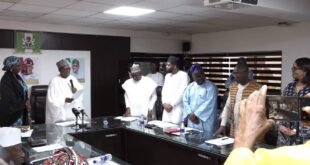NHRC receives 275,256 complaints in May-Ojukwu
… launches the movement dashboard
Abuja (basic reporter) The National Human Rights Commission (NHRC) has revealed that it had received 275,256 complaints in the month of May alone, a situation that the Commission has raised the concern about the growing rate of human rights violations in Nigeria, as captured by the May dashboard.
However, the Commission also officially launched its quarterly dashboard on the internal displacement and human rights in Nigeria, the first of its kind in the history of the nation.
Speaking during the presentation of the dashboard of the human rights situation of May 2025 in Abuja, the executive secretary of the Commission, Dr. Tony Ojukwu, described the volume of the complaints as a clear signal that “too many Nigerians feel unremarited, unheard of and invisible”.
“The dashboard forces us to confront what many Nigerians cross every day. Behind every figure there is a human life, someone looking for security, justice or even just recognition. What is more worrying is the normalization of this anguish. People no longer expect repairs or responsibilities. This is a dangerous place for any society,” he warned Dr. Ojukwu.
The Commission attracted particular attention to Mokwa’s floods in the state of the Niger, which led to the death of over 200 people, with many others still missing. The floods have thinned thousands of people, further aggravating the challenges faced by internal displaced people (IDP) in the country. Dr. Ojukwu observed that the humanitarian crisis in Nigeria is worsening, with IDP that face violations of their security rights, dignity, health care and sustenance.
As part of the efforts to trace and face these problems, the NHRC has launched its quarterly dashboard on the internal displacement and human rights in Nigeria, from February to April 2025. The dashboard, developed in collaboration with the United Nations High Commissioner for refugees (UNCR), provided that the data on the mods, on refugees and on the return and in the seekers of ASYLUM and the objectives and objectives aim to draw attention to human rights.
The displacement dashboard was presented by Ben Agui, special assistant of the executive secretary, while the dashboard for the human rights situation of May 2025 was presented by Hillary Ogbonna, special consultant of the executive secretary on human rights.
According to the report, during the reference period over 40,000 movements were recorded, together with 1,460 complaints for human rights from displaced populations in 34 areas of the local government in 11 states. The NHRC recognized the support of its monitors on the field and local partners who contributed to the collection of data.
The event was attended by representatives of Unicef, Cislac, UNHCR and other interested parties who praised the NHRC commitment for transparency, the defense based on data and responsibility.
With a significant move to promote inclusiveness, the NHRC has also signed a memorandum of understanding (Mou) with life capacity (such), a non -governmental organization that supports the rights of people with disabilities. Dr. Ojukwu stressed that although Nigeria has approved discrimination against people with disabilities (prohibition), 2018 and has ratified the African disability protocol, reality for over 35 million Nigerians who live with disabilities remains demanding.
“This memorandum of understanding with such is our way of reaffirming that people with disabilities must not be put aside. They must be protected, enhanced and fully included in all the spheres of national life,” he said.
Dr. Ojukwu invited government agencies, civil society, development partners and the media to use data in dashboard not only for information, but also to request responsibility for service bearers.
“Let these data are an invitation to action. We don’t see statistics, but Nigerian people who deserve to live free from fear, discrimination and injustice,” he concluded.
The NHRC reiterated its unwavering commitment in the defense of human rights and has committed itself to continuing to strengthen its monitoring, reporting and defense mechanisms for all vulnerable populations.
“The NHRC remains firm in its commitment to safeguard the human rights of all Nigerians. Together, we can transform this commitment into a reality in which every Nigerian lives free from fear, discrimination and injustice.”
 JamzNG Latest News, Gist, Entertainment in Nigeria
JamzNG Latest News, Gist, Entertainment in Nigeria









